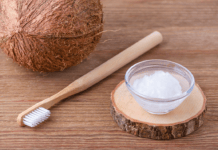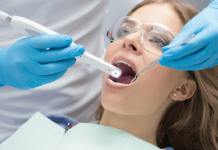Vaping e-cigarettes are fast becoming a popular alternative to smoking traditional cigarettes. A recent study titled, “Cariogenic Potential of Sweet Flavors in Electronic-Cigarette Liquids,” examined how the different e-cigarette flavors may affect a patient’s oral health.
The Rise of Vaping E-cigarettes
E-cigarettes have various nicknames, including “e-cigs,” “vapes” and “vape pens.” E-cigarette devices come in many shapes and colors. Consumers can easily buy e-cigarettes that resemble USB flash drives, pens or regular cigarettes.
Each device has three major components: a rechargeable lithium battery, e-liquid (or flavor), and a vaporizing chamber. When activated, the lithium battery heats the flavor and makes an aerosol vapor users can inhale into their lungs. E-liquids typically contain a various mixture of propylene glycol, vegetable glycerin, nicotine, and other types of flavors which can change how the liquid tastes.
The first official e-cigarette was released in the early 2000s. Now, almost twenty years later, e-cigarettes have displaced cigarettes to become the most used tobacco product by children and young adults. According to recent data, the total number of high schoolers who used e-cigarettes in the past 30 days rose an estimated 75% in 2018. The US Food and Drug Administration reports that 81% of users under the age of 18 said they preferred to vape instead of smoke cigarettes due to the large variety of accessible flavors. Children and teenagers also gravitate towards e-cigarettes because they are easy to use and very discrete, which is helpful when they’re trying to hide the device from teachers and other adults.
Although e-cigarettes are becoming more popular, The Center for Disease Control warns that e-cigarettes may be potentially harmful to children, teens, and young adults because it contains nicotine. Nicotine is a highly toxic and addictive substance that can negatively impact the brain development of adolescents.
Besides nicotine, some e-liquids may contain cancer-causing substances and heavy metals. Meanwhile, other e-liquids have flavors that have been linked to “popcorn lung” and other serious lung diseases. The CDC also warns that e-cigarettes may be a “gateway” to other harmful vices.
The Results of the Study
Many scientists and health professionals understand the health risks associated with nicotine, but not many studies have been conducted that examine the effects of vaping or smoking e-cigarettes on a patient’s oral health.
A new research study published in the journal PloS One discovered the continual use of e-cigarettes might increase a patient’s chances of developing dental caries in the future. The lead researcher, Jeffrey J. Kim, DDS, Ph.D., said he decided to conduct the study because he was curious about how the aerosols from e-cigarettes would affect a person’s teeth. Dr. Kim performed the experiment at the Volpe Research Center in Maryland with a grant from the American Dental Association Foundation.
The researchers systematically evaluated e-cigarette aerosols over time and discovered certain types of sweet e-liquid flavors increased the likelihood of a patient developing caries by promoting the growth and adhesion of Streptococcus mutans to the surface of the tooth. Ultimately, Dr. Kim discovered that e-cigarette flavors reacted with the oral cavity in a manner very similar to candy or highly acidic drinks.
In Conclusion
The study found that e-cigarettes can increase the chances of children, teenagers, and young adults forming dental caries. Since the youth is the fastest growing population to use e-cigarettes, this may negatively impact their oral health during their formative years. Dr. Kim would like to conduct more studies to further examine the health effects of vaping and its implications on oral health. Meanwhile, dental hygienists should warn younger patients against the potential risks of vaping.
SEE ALSO: E-cigarettes: An Unhealthy Epidemic Impacting Adults & Youth
DON’T MISS: Science Confirms Water Fluoridation Prevents Tooth Decay in Children











